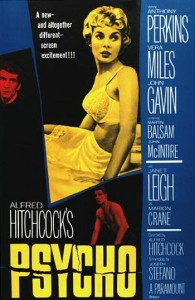Psycho (1960)
*** Burke Favorite ***
Dir: Alfred Hitchcock
Stars: Anthony Perkins, Janet Leigh, John Gavin, Vera Miles and Martin Balsam
*** Welcome to the 100th post of ronhamprod.com: many thanks for reading the numerous entries we’ve posted over the past two years! We look forward to many more posts as the site continues to grow… ***
I watched Psycho a few weeks ago on my new home theater system and thought to myself, this would really make a swell 100th post. I took careful notes and rewound a few scenes as I went in preparation, too! Let me be clear, though: if you haven’t seen this film, do yourself a favor and bump it to the top of your Netflix cue. It’s on the AFI top 100 for good reason and I talk about plenty of revealing items in the pages to follow. That said, get a glass of wine or a cup of coffee or whatever’s your pleasure and get comfy… let’s talk some Psycho.
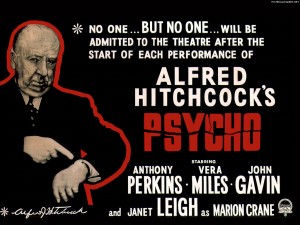 I certainly won’t forget the first time I saw this movie in my basement at home as a teenager: sure, I was shocked by the shower scene, but I was floored by the conclusion. Regardless, my overall theory after this latest viewing is that it’s the seemingly everyday elements surrounding the infamous shower scene and “mom” revealing that make your hair stand on edge. It’s a classic not only because of the great scenes and the memorable music, but also because of the mood Hitchcock creates starting with the mundane act of living and extending to something we can all relate to – how we feel when we’ve done something wrong.
I certainly won’t forget the first time I saw this movie in my basement at home as a teenager: sure, I was shocked by the shower scene, but I was floored by the conclusion. Regardless, my overall theory after this latest viewing is that it’s the seemingly everyday elements surrounding the infamous shower scene and “mom” revealing that make your hair stand on edge. It’s a classic not only because of the great scenes and the memorable music, but also because of the mood Hitchcock creates starting with the mundane act of living and extending to something we can all relate to – how we feel when we’ve done something wrong.
The film opens on a December afternoon in Phoenix, Arizona. The camera takes its time as it pans the city, super-imposes the date and time and finds an ordinary looking hotel. One of the hotel windows is open and we end up entering the room – we’re putting our nose in other people’s business from the beginning. In this room, we find Marion Crane (Janet Leigh) and her lover, Sam Loomis (John Gavin), enjoying a little post-afternoon delight. That’s the first thing you notice about a Hitchcock film: he appreciates your maturity. He doesn’t find it necessary to go all Basic Instinct on us and show gratuitous sex: not that the censors would have tolerated such a scene at the time, anyhow. Sam and Marion are not married, but they’re sneaking around and sleeping with each other in a hotel in the middle of the afternoon. It’s a subtle thing Hitchcock achieves even in this first scene: perhaps it’s me looking into something that isn’t there, but there’s one shot of Marion in profile – like a mug shot – that helps convey a feeling of uneasiness right from the start (see Note 1). There’s also the comment from Sam, as he suggests they meet at Marion’s place next time and turn her Mom’s picture around if it makes her uncomfortable. Her reaction to this comment is kind of funny: she’s totally willing to sleep around with this guy, but talking about Mom’s photo crosses the line! And yet, look at what this dialogue does to the story – it illustrates to us that Marion has a line. Regardless, before Marion hustles back to work on this hot afternoon, they agree they’re going to get married as soon as Sam’s divorce is finalized, even if they have to share a crummy room above the hardware store where he works in Fairview, CA.
Back at the office, the boss has just closed a deal with a cattle baron who wants to give his daughter and her new husband a house as their wedding gift. As if this isn’t outrageous enough, the tipsy client insists on paying cash before having another swig from the bottle in the boss’ office! The boss, completely trusting Marion, gives her the $40,000 cash to deposit in the bank. Their understanding is she’s going to deposit the funds and then head straight home to rest from her headache. Is it just me reading into things too much again, or is that painting behind Marion of a country road a tremendous visual foreshadowing?
 Yep, Marion heads home all right – to pack! She’s got her little valise stuffed to the top with her clothes, and the envelope with $40,000 sits right next to it. Oh, no you didn’t, girl! This is sweet, kind, beautiful little Marion, right? And yet, why are we surprised? The story was pretty clear about her intentions with the first scene. She’s still the one who was pacing the hotel room in her spotless white under-things, who got angry at Sam for the quip about Mom’s picture. In the next scene, Marion is in her car on a crowded Phoenix street, literally leaving town (see Note Z). She’s parked at a busy intersection and who walks by and smiles at her but her boss! Then, he does a double take and continues on. Now, she’s jumpy. She frets. Marion furrows her lovely brow: again, which of us hasn’t been here? Who amongst us hasn’t called in “sick” (I’m talking to you, March Madness viewers) and then worried what would happen if the boss actually caught us?
Yep, Marion heads home all right – to pack! She’s got her little valise stuffed to the top with her clothes, and the envelope with $40,000 sits right next to it. Oh, no you didn’t, girl! This is sweet, kind, beautiful little Marion, right? And yet, why are we surprised? The story was pretty clear about her intentions with the first scene. She’s still the one who was pacing the hotel room in her spotless white under-things, who got angry at Sam for the quip about Mom’s picture. In the next scene, Marion is in her car on a crowded Phoenix street, literally leaving town (see Note Z). She’s parked at a busy intersection and who walks by and smiles at her but her boss! Then, he does a double take and continues on. Now, she’s jumpy. She frets. Marion furrows her lovely brow: again, which of us hasn’t been here? Who amongst us hasn’t called in “sick” (I’m talking to you, March Madness viewers) and then worried what would happen if the boss actually caught us?
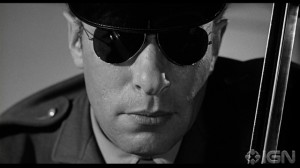 As Marion travels north to Fairview, CA, darkness soon falls on the highway and she pulls over to take a nap. The next morning, a state trooper (in a delightfully retro car, by the way) stops and gives her a knock, waking her up. Some of you may know this, but for those of you who don’t, this was for Hitchcock himself one of the scariest moments in the picture: it turns out ol’ Hitch never got himself a driver’s license merely because he was terrified of being pulled over and getting a ticket! In this scene, Marion is behaving a little odd, so the trooper asks for her license. She has to do a nice little shift of her shoulder to hide the envelope loaded with $40K. After a few more questions, the officer lets Marion go and she’s headed down the road to Fairview again.
As Marion travels north to Fairview, CA, darkness soon falls on the highway and she pulls over to take a nap. The next morning, a state trooper (in a delightfully retro car, by the way) stops and gives her a knock, waking her up. Some of you may know this, but for those of you who don’t, this was for Hitchcock himself one of the scariest moments in the picture: it turns out ol’ Hitch never got himself a driver’s license merely because he was terrified of being pulled over and getting a ticket! In this scene, Marion is behaving a little odd, so the trooper asks for her license. She has to do a nice little shift of her shoulder to hide the envelope loaded with $40K. After a few more questions, the officer lets Marion go and she’s headed down the road to Fairview again.
If we can all agree that Marion is a character we can relate to, then I assume we can also agree that we’ve all had the flitter in our guliver when we see the cop in our rear view mirror. Here, the film cuts between the distinctive highway patrol car in the rear view and Marion’s anxious eyes watching it. Much to Marion’s relief, the patrol car soon disappears from the highway on an off ramp. But, when she shows up at a used car lot in the next town and attempts to switch out her car for another vehicle, she notices the patrolman parked across the street, his arms crossed and stare directed towards her. Again, I think these scenes are worth a second look because we’ve been there: we may not have been attacked in a shower by a killer, but we have had our scary moments with the law. Some of us have been in that hotel room with our own Sam or Marion. Others of us can relate to how she felt looking at the boss crossing the intersection. Don’t these scenes set us on edge before we even get to the “meat of the sandwich?”
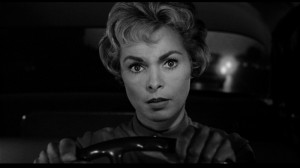 Thinking about the remainder of Marion’s journey towards Fairview is also worth a note or two. Using an elegant combination of sight and sound, Marion’s thoughts are presented to us as we cut back and forth from her staring right at us to the rain soaked highway. Voice overs from the boss, her work colleague and her sister discuss her disappearance with the client’s $40,000. Again, who amongst us hasn’t asked, “What would they say if they found out [xyz] about me?” One of the bits that I had to rewind and watch again was Marion’s face, her expression when she thinks about what the client says! Isn’t this her “going a little crazy sometimes?” as Norman Bates says later. I don’t mean to belabor this point, but I think it’s actually Psycho‘s Act One that scares us – because we’ve behaved like Marion before in one way or another… The threat of being caught is a lot of stress to live with, and would have been a completely appropriate direction to take for Acts Two and Three… but here’s where main course is served.
Thinking about the remainder of Marion’s journey towards Fairview is also worth a note or two. Using an elegant combination of sight and sound, Marion’s thoughts are presented to us as we cut back and forth from her staring right at us to the rain soaked highway. Voice overs from the boss, her work colleague and her sister discuss her disappearance with the client’s $40,000. Again, who amongst us hasn’t asked, “What would they say if they found out [xyz] about me?” One of the bits that I had to rewind and watch again was Marion’s face, her expression when she thinks about what the client says! Isn’t this her “going a little crazy sometimes?” as Norman Bates says later. I don’t mean to belabor this point, but I think it’s actually Psycho‘s Act One that scares us – because we’ve behaved like Marion before in one way or another… The threat of being caught is a lot of stress to live with, and would have been a completely appropriate direction to take for Acts Two and Three… but here’s where main course is served.
The rain pelts Marion’s new car and she’s clearly not comfortable continuing her journey. The sound of the rain and the musical score accompanying her thoughts as she drives has been almost climactic, which is highlighted by her arrival at the Bates Motel. I was interested to observe that when she gets out of the car and looks for the motel manager, there is no sound at all, except for the rain. It’s as if the film is respecting our intelligence and saying this sinister hotel is scary enough without an obvious soundtrack added. And perhaps the place isn’t so bad after all, based on the young, lanky, good looking manager. At first glance, Norman Bates (Anthony Perkins) seems downright goofy. He’s got his hands in his pockets. He seems a little intimidated by Marion’s beauty. He repeats himself, as some of us do when we’re nervous. And his grin is warm and innocent. He is not… threatening.
As Bates is checking Marion in, I was interested to note that she’s within 15 miles of her destination, but opts not to continue. She unpacks a bit and stuffs the envelope with the money in a copy of the LA Times, placing it carefully on the nightstand. Then, Norman and Marion have a bite to eat in the parlor, right off the motel office. Norman explains his hobby is taxidermy in reference to the huge, swooping stuffed birds on the walls of the parlor. The lighting used gives the effect that these birds are hunting in a wooded area (maybe I’m over-thinking the wood paneling on the walls). It’s as if the characters’ discussion, about people locking themselves in their own little cages fits the setting perfectly. The conclusion of the scene concerns Marion’s admission that she’ll be leaving before dawn the next day and retracing her steps to Arizona. She even gives Norman her real name, which he checks against the false name and address she gave when she filled in the register.
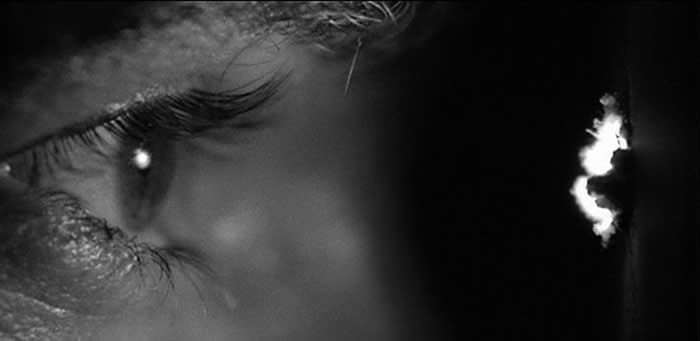 And then something extremely creepy happens. Norman goes back in the parlor, presumably to take back the tray of sandwiches and milk. But then, he stands in the middle of the room and stares at a picture hanging on the wall. He agonizes for a few seconds, then crosses to the picture, removes it and reveals a hole in the wall. In one of my favorite shots, there is a close up of Norman’s eye on the left side of the screen, bathed in light from Marion’s room coming from the right side of the screen. This might be one of my favorite shots in all the movies I’ve ever seen. I’m not trying to be dramatic. But, really, isn’t Norman’s peeking what we’ve all been doing since Theatre was invented? I think this shot kind of defines the essence of the movie experience.
And then something extremely creepy happens. Norman goes back in the parlor, presumably to take back the tray of sandwiches and milk. But then, he stands in the middle of the room and stares at a picture hanging on the wall. He agonizes for a few seconds, then crosses to the picture, removes it and reveals a hole in the wall. In one of my favorite shots, there is a close up of Norman’s eye on the left side of the screen, bathed in light from Marion’s room coming from the right side of the screen. This might be one of my favorite shots in all the movies I’ve ever seen. I’m not trying to be dramatic. But, really, isn’t Norman’s peeking what we’ve all been doing since Theatre was invented? I think this shot kind of defines the essence of the movie experience.
Instead of going over the details of the shower scene – for there is plenty of analysis available on that little piece of cinema history from much more reputable sources than myself – I only want to mention that it pretty much proves that movies are a blend of sight AND sound. Try watching that scene on mute: it’s like watching Star Wars or Die Hard without sound! Instead, I’d rather take a look at the aftermath of the murder in the shower. We hear Bates reacting to his Mom’s actions up at the house. He comes tearing down the hill and into Marion’s room and covers his mouth from the shock – probably reflecting what many of us did the first time we saw the film. Then, with no soundtrack to remind us how tense we feel (because it’s not necessary), we watch Bates clean up the mess. All the blood is mopped down the drain (shiver). All of Marion’s things go in the trunk of her car. He checks the drawers – yep, got everything. Wait a minute. What about that copy of LA Times over there? I love the fact that Bates tosses the paper in the trunk like it’s just a newspaper: because even the $40K inside is just paper! Sure, it was important to Marion earlier today, but now…
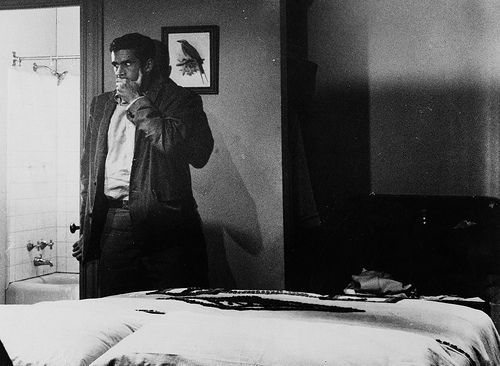 Did you ask yourself, “What about the money?” towards the end of Bates’ cleaning of the room? Again, it’s like the production is judging us as we’ve just witnessed a murder of someone we’ve come to know and maybe root for, and yet we can’t help ourselves from wondering, “What about the newspaper he just tossed in the trunk – what’s going to happen to THAT?!?” As if this reaction to the cash isn’t enough, the next scene does the same thing to us. Bates rolls Marion’s car around the back to a little bog behind the motel. He gets out, slides it in neutral and pushes it in: and the bloody thing stops sinking! Now, Bates, who I believe is chewing his fingernails, stops dead. But let me ask you this – did you stop, too? Did you kind of want it to sink? Based on this scene with the car eventually sinking into the bog, I think that Hitchcock was 100% accurate when he told Billy Wilder in an interview that he “played the audience like a piano,” with Psycho. I know he played me like a church organ…
Did you ask yourself, “What about the money?” towards the end of Bates’ cleaning of the room? Again, it’s like the production is judging us as we’ve just witnessed a murder of someone we’ve come to know and maybe root for, and yet we can’t help ourselves from wondering, “What about the newspaper he just tossed in the trunk – what’s going to happen to THAT?!?” As if this reaction to the cash isn’t enough, the next scene does the same thing to us. Bates rolls Marion’s car around the back to a little bog behind the motel. He gets out, slides it in neutral and pushes it in: and the bloody thing stops sinking! Now, Bates, who I believe is chewing his fingernails, stops dead. But let me ask you this – did you stop, too? Did you kind of want it to sink? Based on this scene with the car eventually sinking into the bog, I think that Hitchcock was 100% accurate when he told Billy Wilder in an interview that he “played the audience like a piano,” with Psycho. I know he played me like a church organ…
One bit of criticism related to Psycho relates to the final scene with the psychiatrist (Simon Oakland) attempting to explain Norman’s behavior and how he’s come to use his deceased mom as a coping mechanism. I didn’t find the scene that boorish: but I’ll admit that it does come across a little dated. I’ll put it this way – if the film has a weakness, it is this scene, which seems somehow out of place. How else would you have ended it, though? After all, the last frame isn’t the psychiatrist at all. We cut from his discussion to Norman wrapped up in a blanket in a holding cell. He doesn’t say anything: “mother” is speaking for him at this point. But do yourself a favor and go frame by frame as we dissolve from his gaze to that final shot of Marion’s car getting dragged out of the bog: see anything?
 In closing, let’s switch focus to another theme of the film that makes the whole experience creepy: whether it’s Psycho or any other film in the Horror of Thriller/Suspense genres, there is a focus on death itself. I know, I know – why don’t I get a little more serious, right? But remember, I’m trying to say that it’s the other elements outside of the shower scene and the mom angle that make this film so effective. Think about how several characters in the film are going about their “normal,” seemingly everyday lives when moments later, they’re dead. Marion is just taking a shower, getting ready for bed and hoping to get a decent night’s sleep before taking responsibility for her actions and heading back to Phoenix. She had no clue that sandwiches made by Norman Bates would be her last meal on earth. Poor Arbogast, the private detective hired by the millionaire from Phoenix to find his missing $40K, is working on another typical, run-of-the-mill, boring missing person’s case. He heads into an old house on top of a hill to speak with a sick old lady, and before you know it he’s falling head over heels down the steps from a stab wound. He had no idea whatsoever that his call to Marion’s sister, Lila, would be his last telephone call ever. Even Lila comes pretty close to getting it. This idea of how narrow the line is between life and death is absolutely terrifying – and yet, it’s something we all think about from time to time.
In closing, let’s switch focus to another theme of the film that makes the whole experience creepy: whether it’s Psycho or any other film in the Horror of Thriller/Suspense genres, there is a focus on death itself. I know, I know – why don’t I get a little more serious, right? But remember, I’m trying to say that it’s the other elements outside of the shower scene and the mom angle that make this film so effective. Think about how several characters in the film are going about their “normal,” seemingly everyday lives when moments later, they’re dead. Marion is just taking a shower, getting ready for bed and hoping to get a decent night’s sleep before taking responsibility for her actions and heading back to Phoenix. She had no clue that sandwiches made by Norman Bates would be her last meal on earth. Poor Arbogast, the private detective hired by the millionaire from Phoenix to find his missing $40K, is working on another typical, run-of-the-mill, boring missing person’s case. He heads into an old house on top of a hill to speak with a sick old lady, and before you know it he’s falling head over heels down the steps from a stab wound. He had no idea whatsoever that his call to Marion’s sister, Lila, would be his last telephone call ever. Even Lila comes pretty close to getting it. This idea of how narrow the line is between life and death is absolutely terrifying – and yet, it’s something we all think about from time to time.
Note X: It’s also astounding to me how the film seems dated – and yet timeless. The hotel might look a little different, but there are still Marions and Sams out there doing the same thing. In other words, Psycho’s core is a relate-able subject, that we all have fears and secrets we live with on a daily basis.
Note Z: I can’t remember, but is this when we see Hitchcock himself? I know he was infamously known for inserting himself in his films – my favorite was North by Northwest – but I can’t recall where he shows up in Psycho…

